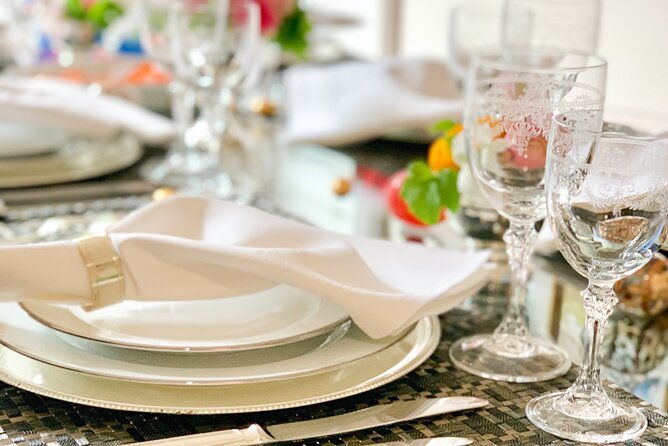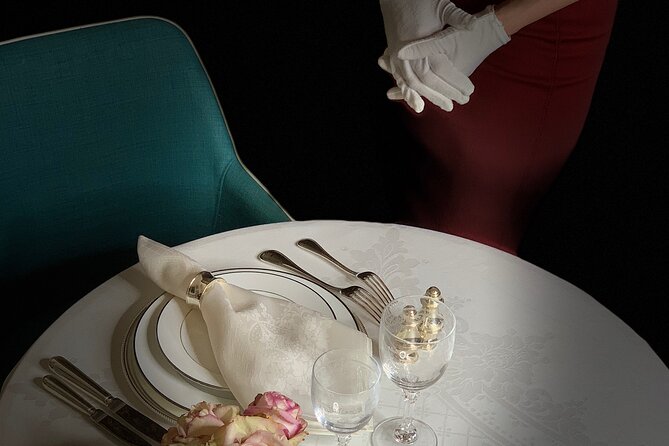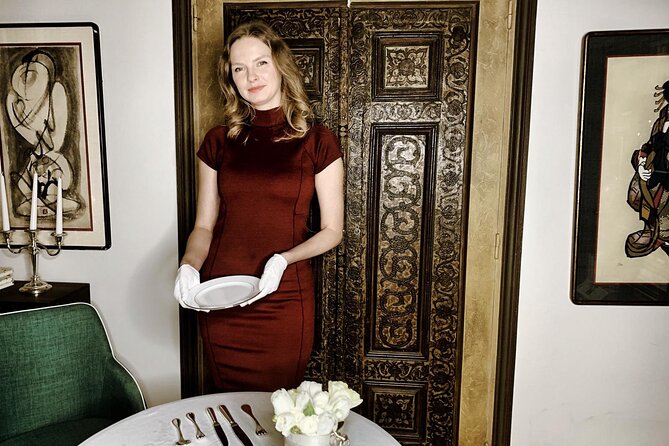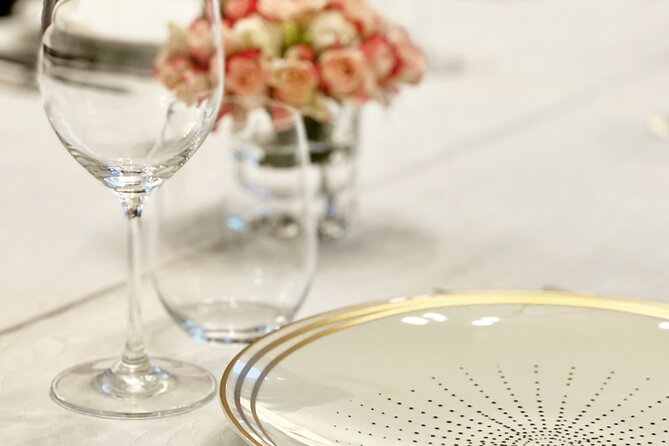Table Manners a La Française
French table manners exude a sense of elegance and sophistication, embodying a rich tapestry of cultural traditions and social conventions. From the precise placement of cutlery to the subtle intricacies of dining gestures, ‘Table Manners a La Française’ unveils a world where every movement at the table speaks volumes.
The history and significance of these customs offer a glimpse into a society that values tradition and refinement, where dining transcends mere sustenance to become an art form in itself. As we embark on this exploration of French dining etiquette, we uncover a realm where every meal is a celebration of culture and connection, inviting us to partake in a symphony of flavors and rituals that define the essence of French gastronomy.
Key Points

- French table manners exhibit centuries of refinement and status symbolism.
- Proper etiquette signifies respect, fostering connections and social harmony.
- Traditional French dining customs emphasize patience, elegance, and cultural admiration.
- Observing table setting rules and polite dining behavior reflects sophistication and respect in dining experiences.
History of French Table Manners

French table manners have evolved over centuries, reflecting the rich cultural heritage and societal norms of France. The historical dining norms in France have greatly influenced the way French people approach meals.
Initially, dining in France was a communal affair, with elaborate feasts showcasing wealth and status. However, with the French Revolution and changing social structures, dining became more refined and focused on etiquette, leading to the development of specific rules and customs.
The evolution of French dining etiquette has been shaped by various factors, including regional differences, the influence of prominent figures like Louis XIV, and the rise of culinary arts. Understanding the history of French table manners provides insight into the importance placed on dining etiquette in French culture.
Importance of Proper Etiquette
Understanding and practicing proper etiquette is essential for navigating social interactions with grace and respect.
-
Etiquette evolution: Etiquette has evolved over time to reflect contemporary values and customs.
-
Social norms: Following social norms helps individuals establish rapport and build meaningful connections.
-
Respectful behavior: Proper etiquette demonstrates respect for others and cultivates a harmonious social environment.
Adhering to etiquette guidelines not only showcases one’s manners but also fosters a sense of mutual understanding and consideration in social settings. By recognizing the importance of proper etiquette, you can navigate various social situations with poise and convey a positive image to those around them.
Traditional French Dining Customs

Proper conduct during dining experiences holds a significant role in showcasing cultural appreciation and respect. Traditional French Dining Customs offer a rich tapestry of rituals and practices that reflect the country’s gastronomic heritage. French culinary traditions emphasize the enjoyment of food as a multisensory experience, where meals are seen as a moment to savor and appreciate flavors.
Dining etiquette in France often includes waiting for everyone to be served before starting to eat, holding cutlery in specific ways, and keeping hands visible on the table. It is customary to say ‘Bon appétit’ before starting a meal and to keep pace with the slow and relaxed rhythm of dining. Understanding and respecting these customs can enhance the dining experience and show admiration for French culinary culture.
Common Table Setting Rules

When arranging a table for a formal dining setting, following common table setting rules is essential to create an elegant and organized presentation for the meal ahead.
-
Table Setting Guidelines: Understanding where to place each piece of cutlery and dinnerware is crucial for a polished look.
-
Cultural Differences: Different cultures have varying traditions when it comes to table arrangements, so it’s important to be aware of these nuances.
-
Etiquette Rules: Observing proper etiquette, such as placing utensils in the correct order and using them appropriately, is a sign of respect for the dining experience.
These elements all contribute to a harmonious and sophisticated dining atmosphere, reflecting the importance of dining traditions in various societies.
Polite Dining Behavior Tips

Exhibiting courteous behavior during meals is a hallmark of refined dining etiquette. Understanding social norms and dining etiquette is crucial for a successful dining experience in French culture. It is customary to wait for everyone at the table to be served before starting to eat.
Keep your hands visible at all times, resting them on the table, but not your elbows. Avoid loud noises when cutting food or clanging utensils against plates. Plus, it is polite to say ‘Bon appétit’ before starting your meal.
Remember to pace yourself throughout the meal, engaging in conversation and savoring each course. Showing respect for the food, the chef, and your dining companions is key to practicing good manners at the French table.
Cultural Significance of Mealtime
Understanding the cultural significance of mealtime in French society provides valuable insights into the deep-rooted traditions and social customs that shape dining experiences in this gastronomically rich country.
-
Social Norms
-
Mealtime is a time for connection and bonding with family and friends, emphasizing the importance of relationships and community.
-
Culinary Traditions
-
French mealtime rituals reflect the nation’s pride in its culinary heritage, showcasing a reverence for food quality and preparation techniques.
-
Symbolism
-
Meals are not just about sustenance but also serve as a symbol of French identity, history, and cultural heritage, reinforcing a sense of national pride and tradition.
Modern Dining Trends in France

In modern French dining culture, there has been a notable shift towards embracing innovative culinary concepts and contemporary dining experiences that blend tradition with creativity. French culinary innovations have taken center stage, with chefs pushing boundaries to offer unique flavor combinations and visually stunning presentations.
From molecular gastronomy to fusion cuisine, restaurants in France are continuously exploring new ways to delight diners and elevate their dining experiences. Contemporary dining experiences now often involve immersive storytelling, interactive elements, and sustainable practices, reflecting a growing awareness of environmental and social issues.
This fusion of tradition and innovation has led to a dynamic culinary landscape in France, where every meal becomes not just a feast for the palate but a multisensory journey.
Common questions

Can You Recommend Any Specific Restaurants in France Known for Their Adherence to Traditional French Dining Customs?
French Michelin starred restaurants are renowned for their exceptional adherence to traditional French fine dining etiquette. Le Bernardin in Paris and Maison Lameloise in Burgundy are exquisite choices known for their impeccable service and adherence to French culinary customs.
Are There Any Regional Variations in French Table Manners That Visitors Should Be Aware Of?
Regional variations in French table manners reflect diverse cultural influences. Visitors should note nuances like hand placement, utensil use, and seating etiquette, which can differ between regions. Understanding these subtleties enhances the dining experience.
What Is the Typical Duration of a French Meal Compared to Meals in Other Cultures?
The duration of a French meal is typically longer compared to many other cultures, emphasizing leisurely enjoyment and social interaction. This difference in dining duration reflects diverse mealtime etiquette practices and global cultural variations.
How Do French Dining Customs Differ Between Formal and Informal Settings?
French dining etiquette varies greatly between casual and formal settings. In casual dining, expect a relaxed atmosphere with less strict rules. Formal dining involves multiple courses, proper use of cutlery, and adherence to traditional table manners.
Are There Any Specific Gestures or Phrases That Are Commonly Used to Show Appreciation for a Meal in France?
In France, nonverbal cues like savoring each bite, maintaining eye contact with the host, and refraining from discussing negative topics during meals express appreciation. Politeness is key, with phrases such as "C’est délicieux" (It’s delicious) commonly used to convey gratitude in culinary etiquette.
Last Words
To sum it up, French table manners encapsulate a rich history of elegance and tradition, reflecting values of respect and conviviality.
By mastering the nuances of proper etiquette and dining customs, you can navigate social gatherings with grace and sophistication.
The cultural significance of mealtime in France is evident in the attention to detail in table setting and dining behavior.
Understanding and appreciating these traditions can enhance one’s dining experiences and leave a lasting impression on hosts and guests alike.